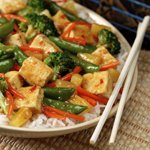Vegetarians: Pondering Protein?
What alternative proteins are there for vegetarians and how much protein should a healthy vegetarian main course meal provide?
Andrew Weil, M.D. | December 11, 2002

Updated on 3/21/2005
Many people – vegetarian or not – worry that they’re not getting enough protein and believe that meals should be built around a big serving of it. Becoming a vegetarian, or following a vegetarian diet, means unlearning the habit of organizing meals around centerpieces of meat and poultry and becoming acquainted with the wide variety of satisfying protein-rich dishes that can be made from foods from non-animal sources.
Whether or not you’re a vegetarian, I recommend that you divide your daily calories as follows: 40 to 50 percent from carbohydrates (including vegetables, fruit, whole grains, starchy roots and tubers, and legumes), 30 percent from fat, and 20 to 30 percent from protein, which amounts to between 100 and 150 grams on a 2,000 calorie-a-day diet.
You may have heard that vegetable sources of protein are “incomplete” and become “complete” only when correctly combined. Research has discredited that notion so you don’t have to worry that you won’t get enough usable protein if you don’t put together some magical combination of foods at each meal.
You’ll do well if you eat a balanced diet with lots of fruits and vegetables, legumes, nuts, seeds and soy foods – some newer varieties are very tasty. Try baked tofu, which has the consistency of cooked chicken and comes in a variety of flavors. It is great in anything from fajitas to stir-fries and can even be eaten right out of the package. Another excellent source of vegetable protein is wheat meat (gluten), much used in Chinese vegetarian cuisine.
If you’re eliminating dairy products, make sure you’re getting adequate calcium by eating green vegetables such as collards, mustard greens and kale, calcium-fortified soy milk and orange juice, and tofu processed with calcium sulfate. If you eat no animal foods make sure you get enough vitamin B12 from fortified soy milks or cereals or by taking a supplement. Other nutrients sometimes deficient in a vegetarian diet are zinc and iron. You’ll absorb these minerals best by eating foods high in vitamin C in the same meal. Cereals, grains, legumes, dates, prunes, raisins and greens provide iron, and you can get zinc from leavened breads, legumes, nuts and spinach.
Andrew Weil, M.D.










